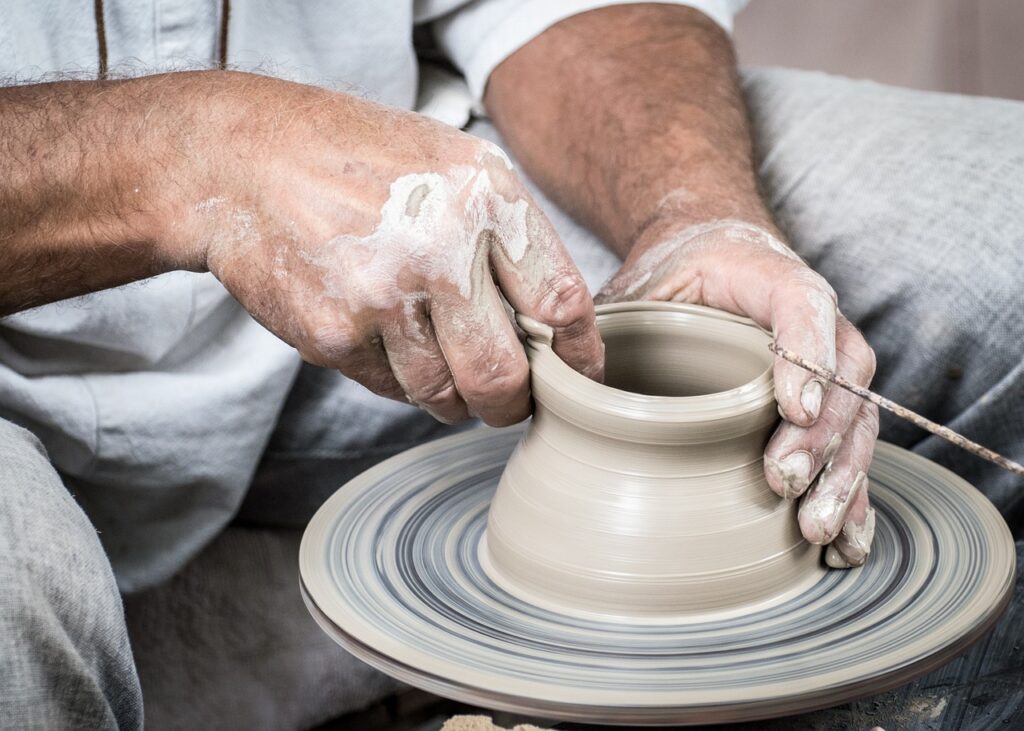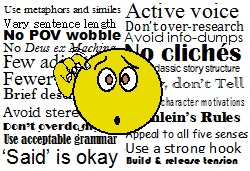A while back, I wrote a post urging writers to create terrible first drafts of their stories. I received some push-back from a writer/editor friend and figured I’d share that perspective.
In my post, I suggested you write first drafts in free-flow mode, unconstrained by your inner editor. Go at a breakneck pace, letting the passion and enthusiasm for the story carry you along. You can fix the manuscript in later drafts, but it’s difficult to get the passion back if you lose that.
My friend thought differently, and likened writing to making clay pots on a potter’s wheel. What follows are the points my friend made in countering my advice, summarized and put in my own words:
- One process won’t work for all writers, and not even for the entirety of a single writer’s career.
- I passed through many stages of writing, including creating horrible first drafts. It’s like shaping clay on a potter’s wheel. The first time, you end up with blobs of clay all over the art studio.
- Over time, I developed the skill to shape the clay without spattering, to produce first drafts akin to what had been 3rd, 5th, or 7th drafts before. This new mindset took a lot of practice.
- Even now, I sometimes have to sit back and gaze at my first draft with a critical eye to spot and fix flaws. But it’s usually no more than cosmetic changes—adding the final glaze to the clay pot.
- Writing a good first draft keeps me from falling out of love with the story. It speeds the whole writing process and avoids the common problem of self-doubt and self-loathing some writers experience.
- I no longer dread the editing process. Since I have less to do, it isn’t the colossal task it once was.
- I have conserved a writer’s most precious resource—time. In writing good first drafts, I now use the saved time to write the next story, or to edit the next anthology.
- All writers, I believe, can and should try to reach this stage. After all, a good writer studies other aspects of the craft and strives to improve. Why not accept the challenge of writing better first drafts? You may find you can create a first draft at high speed, lost in the white-hot heat of inspiration, while still producing quality prose.
- I suggest not leaving a lot of editing for later. Edit on the fly. That includes spelling, grammar, character name changes, whatever.
- If you need to do some research, don’t leave that for later. Set a timer for ten minutes and do a quick Internet search. Chances are, you’ll find enough information for now, and the quick research will aid you in later sections of your story, too.
- Some writers worry their voice, style, or tone will change as they write their book. Not me. I warm up for each day’s writing by reviewing the last few pages to get my brain tuned to the story, so my writing stays consistent. That review is another opportunity to perform minor edits, too.
- If you work at making good first drafts, you’ll save both time and aggravation. You’ll no longer spend 90% of your time re-writing.
That’s my friend’s advice. I still think beginning writers shouldn’t beat themselves up about terrible first drafts. However, I agree it’s good to strive for more polished early drafts as you hone your craft.
My first drafts have improved over time, but this blogpost endured a few editing sessions at the keyboard of—
Poseidon’s Scribe


 At one extreme, 1/E could be very small. In this case, you might spend twenty years polishing a novel, editing and re-editing draft after draft. Your final product might be very good and might become a classic, but you couldn’t repeat your success too many times.
At one extreme, 1/E could be very small. In this case, you might spend twenty years polishing a novel, editing and re-editing draft after draft. Your final product might be very good and might become a classic, but you couldn’t repeat your success too many times.